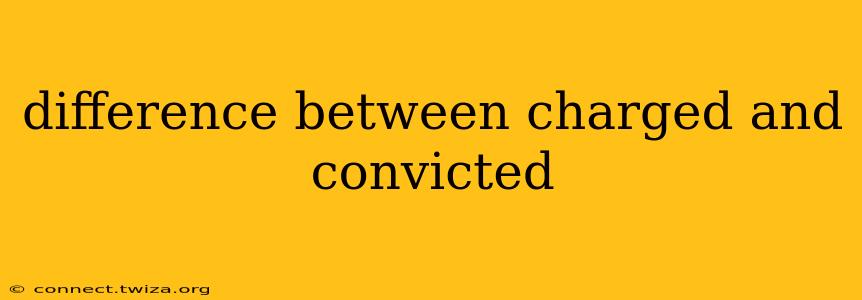The terms "charged" and "convicted" are often used interchangeably in casual conversation, but in the legal world, they represent distinct stages in the criminal justice process. Understanding the difference is crucial for comprehending how the legal system works and the rights of the accused. This article will clarify the distinction between being charged and being convicted, addressing common questions along the way.
What does it mean to be charged with a crime?
Being charged with a crime means that a law enforcement agency has formally accused an individual of committing a specific offense. This usually happens after an investigation, where evidence is gathered to support the accusation. The charge is a formal accusation, not a declaration of guilt. The individual is then formally notified of the charges against them through a document like an indictment or a criminal complaint. This initiates the legal proceedings. Crucially, at this stage, the accused is presumed innocent until proven guilty.
What does it mean to be convicted of a crime?
A conviction occurs after a trial or a guilty plea. A conviction signifies that a court of law has found the accused guilty beyond a reasonable doubt of the charges brought against them. This is the final judgment in a criminal case, establishing legal culpability. A conviction carries significant consequences, such as fines, imprisonment, probation, or other penalties mandated by law.
What is the difference between an arrest and being charged?
An arrest is the apprehension of a suspect by law enforcement. While an arrest often precedes charges, it's not always the case. Someone can be charged without being formally arrested, particularly if they voluntarily turn themselves in or are already in custody on unrelated charges. The charge is the formal accusation, while the arrest is the physical act of taking the suspect into custody.
What happens after someone is charged with a crime?
After being charged, several things can happen:
- Arraignment: The accused appears before a judge, hears the charges, and enters a plea (guilty, not guilty, or no contest).
- Discovery: Both the prosecution and defense exchange information and evidence.
- Plea Bargaining: Negotiations may occur between the prosecution and defense to reach a plea agreement, avoiding a trial.
- Trial: If a plea agreement isn't reached, the case proceeds to trial, where a judge or jury determines guilt or innocence.
Can someone be charged but not convicted?
Yes, absolutely. Many cases end in acquittals (not guilty verdicts), dismissals, or plea bargains that result in reduced charges or alternative sentencing. A charge is simply an accusation; it doesn't guarantee a conviction. The burden of proof rests entirely on the prosecution to prove guilt beyond a reasonable doubt.
What are the consequences of a conviction?
The consequences of a conviction vary greatly depending on the severity of the crime, the jurisdiction, and the defendant's criminal history. Possible consequences include:
- Imprisonment: Serving time in jail or prison.
- Fines: Monetary penalties.
- Probation: Supervised release into the community with conditions.
- Community Service: Unpaid work for the community.
- Loss of Rights: Potential loss of voting rights, gun ownership rights, or professional licenses.
What is the difference between a felony and a misdemeanor?
This distinction impacts the severity of the consequences. Felonies are generally more serious crimes, carrying heavier penalties such as lengthy prison sentences, while misdemeanors are less serious offenses with less severe punishments.
In conclusion, being charged and being convicted are two vastly different stages in the legal process. A charge is a formal accusation, while a conviction is a finding of guilt by a court of law. Understanding this distinction is key to navigating the complexities of the criminal justice system.
